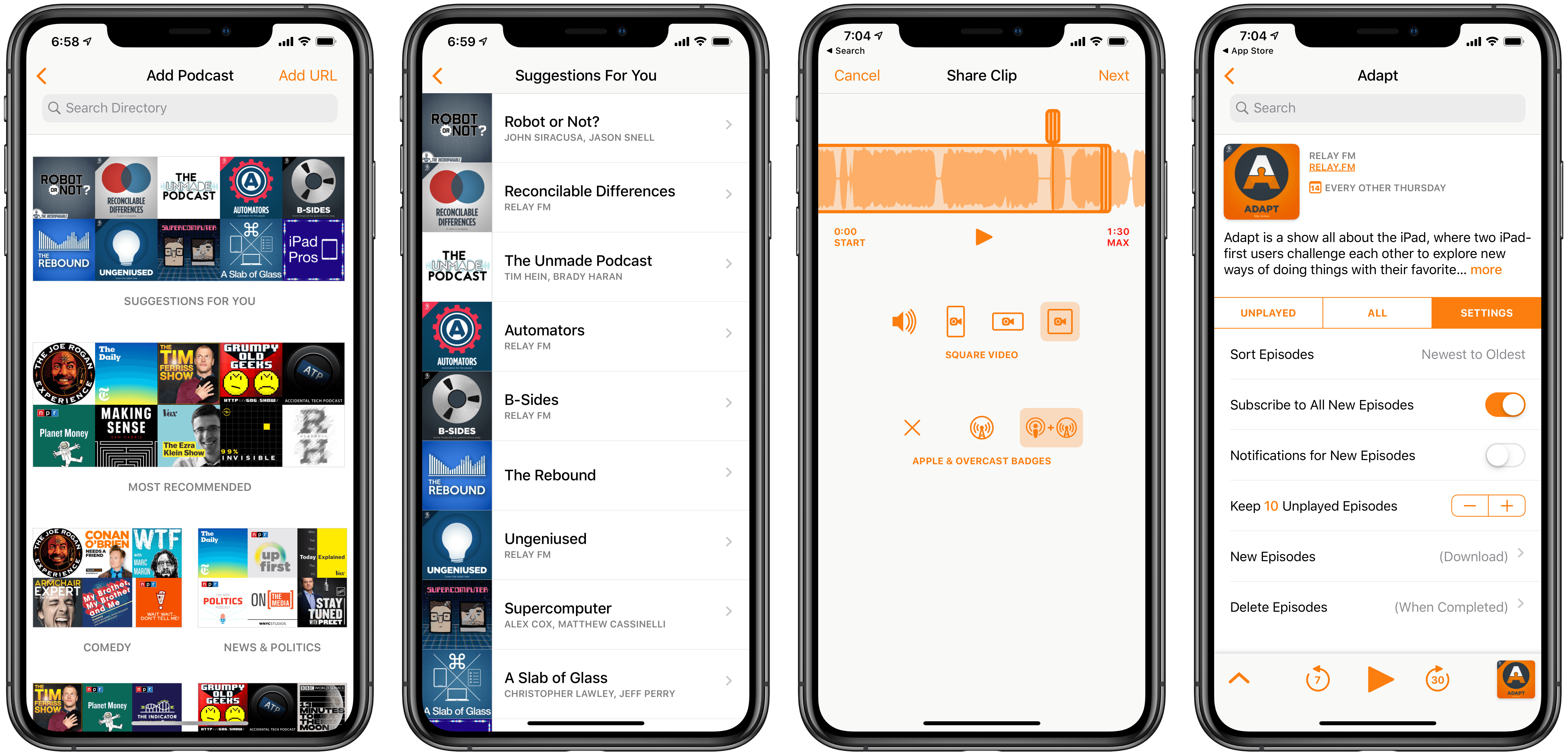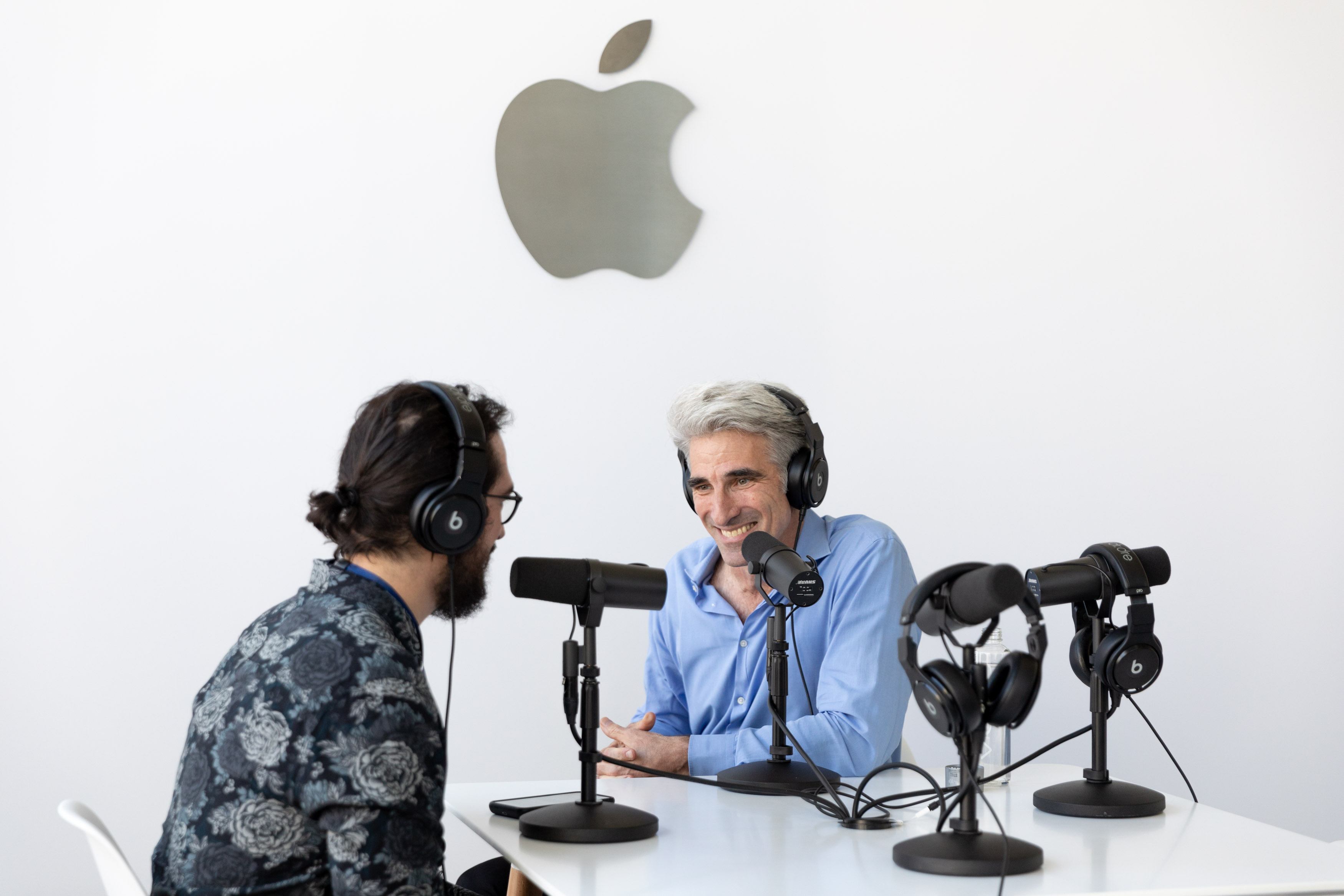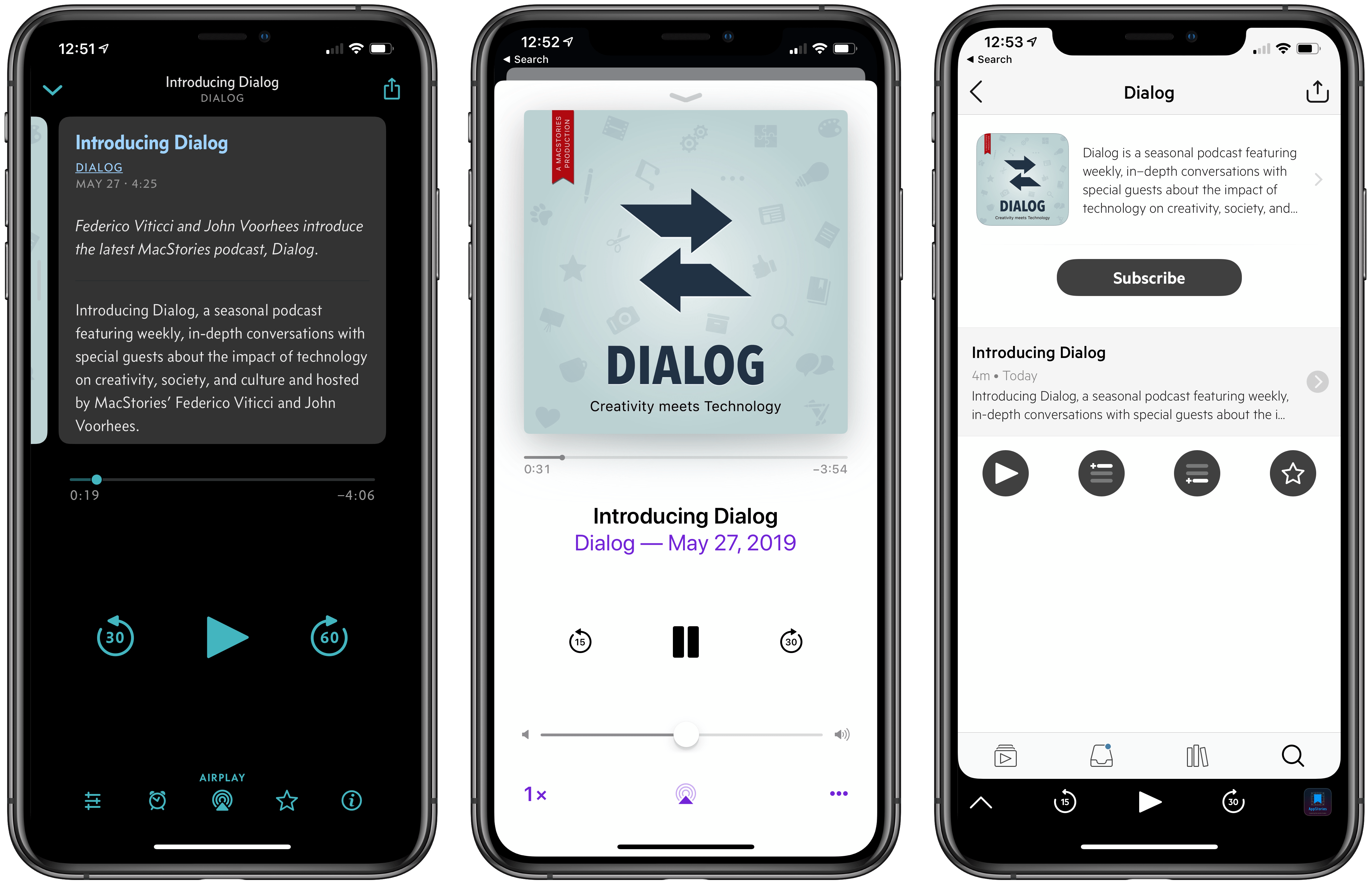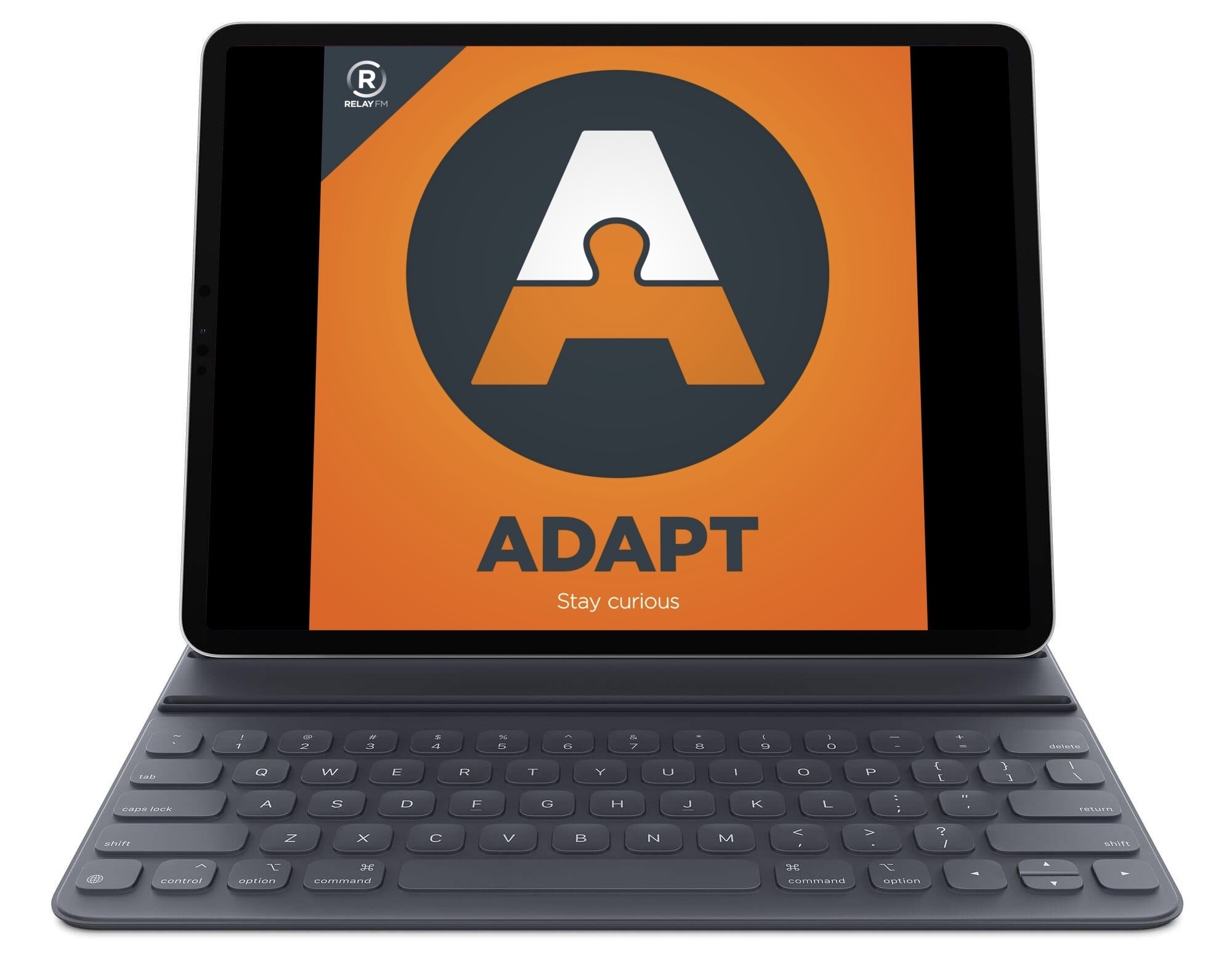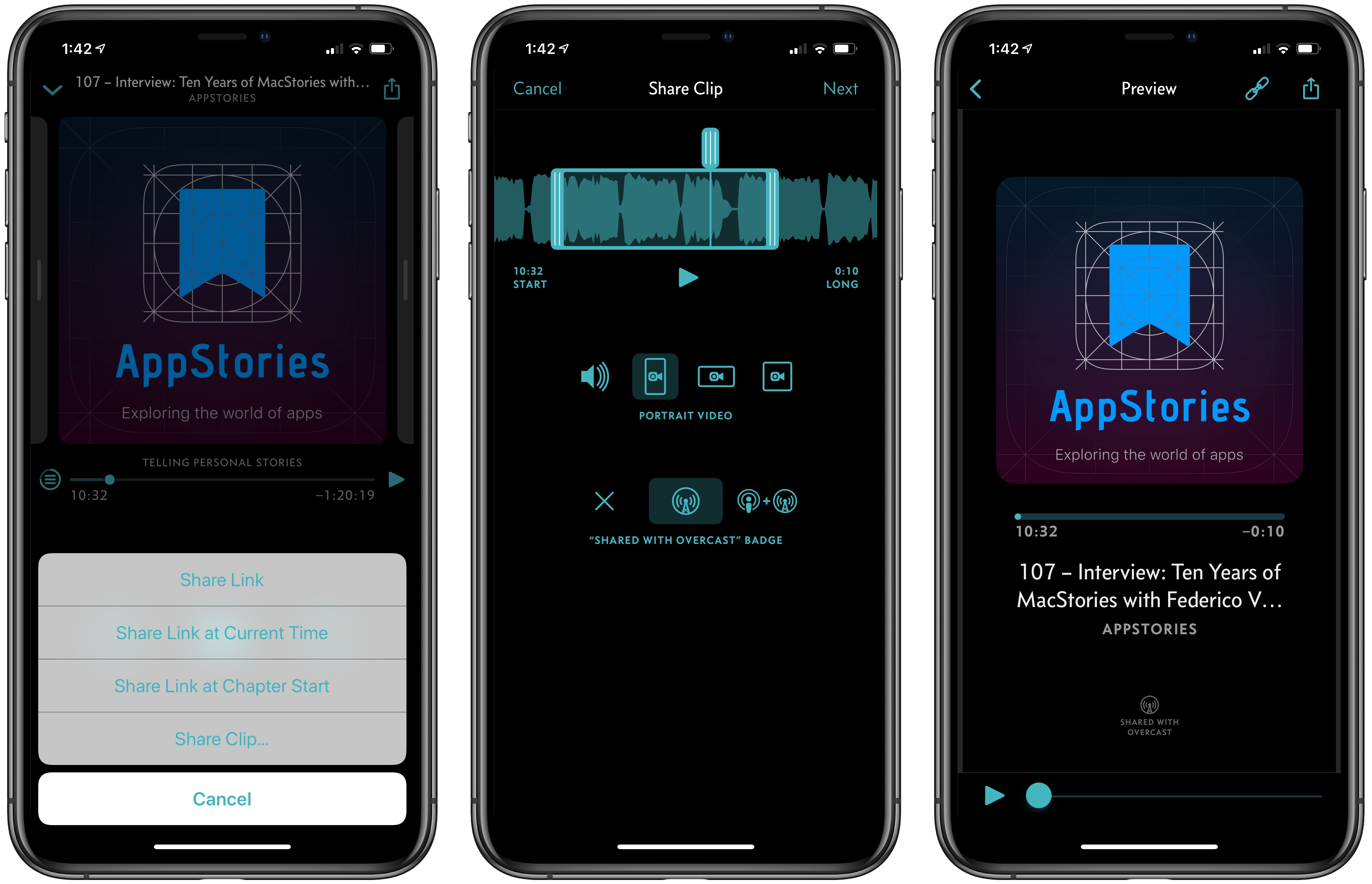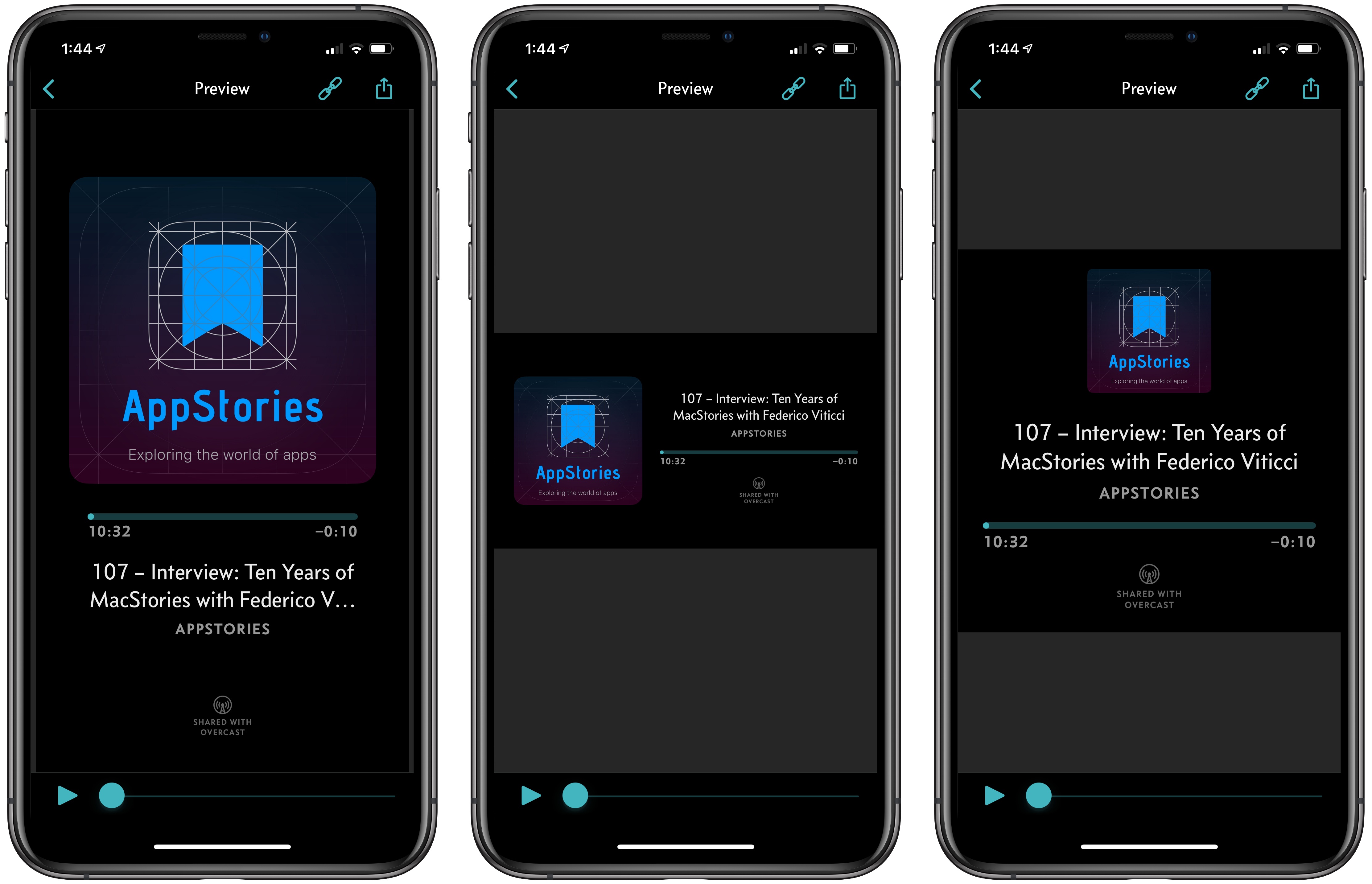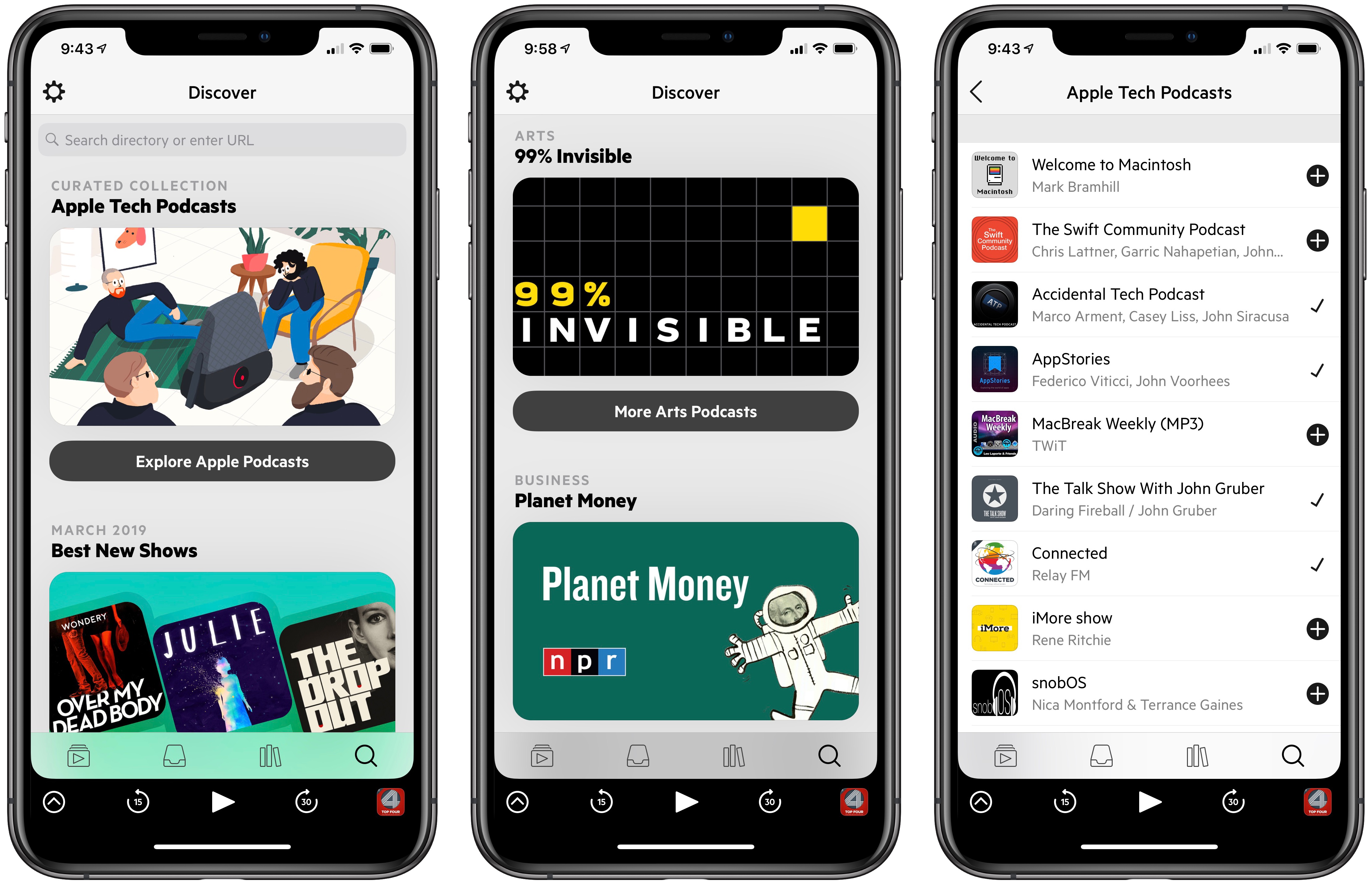Over the weekend, podcast client Overcast launched a few new features in its latest update. Most notably, the app’s recommendation engine for suggesting new podcasts has been completely revamped and improved in a big way. Additionally, the recently added feature for sharing video clips of podcasts has an extended length limitation, and you can now set per-podcast settings for new parameters.
Posts tagged with "podcasts"
Overcast Launches New Recommendations and Extended Clip Sharing
Dialog Season 1, Episode 3: A Conversation with John Gruber (Part 2)
Today, we published the second part of our Dialog interview with John Gruber of Daring Fireball. You can find the episode here or listen in the Dialog web player below.
Like Federico, John Gruber was one of the first people I thought of when we began planning this first season of Dialog about writers and writing. Daring Fireball was an inspiration for me too, but in a slightly different way.
I first met Gruber in 2012 at the first Úll conference in Dublin, Ireland, where he was a surprise speaker. That was before I built my first iOS app or was writing or podcasting. I went to Úll on a lark to get a closer look at the iOS developer community I’d been following as I started to teach myself Objective-C. By the end of three days chatting with Gruber and other writers and developers at Úll, I knew I wanted to be part of that scene, creating my own apps. It would be almost three years before I launched Blink, my first app that drew any attention, and five before I could quit my old job, but that’s precisely why this second part of our interview with Gruber resonated with me.
Daring Fireball started like many indie businesses: as a labor of love that Gruber wrote on the side while working another job. The site didn’t earn enough to make it a full-time job at first, but over time it grew, and Gruber was faced with a choice. Daring Fireball had reached a point where it had a shot at supporting him and his family, but not unless he quit his day job, which he did.
In the latest installment of Dialog, we continue our conversation about the difficulty of making it as an indie writer online today. Gruber discusses how his priorities have shaped Daring Fireball, the audience for whom he writes, and maintaining the site’s relevance long-term.
Of course, no interview with Gruber would be complete without talking about Markdown. Although we nearly forgot to ask about it, I’m glad we did because it’s not easy to remember that Markdown, which debuted 15 years ago, took a while to catch on. Markdown’s human-readable syntax may not have clicked with writers on the web in 2004, but as more people who didn’t have experience with HTML started their own websites, Markdown gained momentum. Today, it’s used on all sorts of platforms and in text editors, blogging tools, and even Apple’s own Xcode IDE.
As we conclude our first Dialog interview, I want to thank John Gruber for taking the time to be our first guest on Dialog. Next week, we’ll begin a two-part interview with singer-songwriter Frank Turner, who we caught up with as he passed through Madison, Wisconsin on tour last month. I’m excited to share those episodes for a couple of reasons. First, it was a personal thrill to interview Turner, whose music I love. Second, while the conversation is a departure from what you likely hear on a lot of your favorite tech podcasts, there are fascinating parallels between John Gruber’s writing on Daring Fireball and Turner’s songwriting, which is precisely what we’d hoped for when we began this season.
Finally, thanks for listening. If you missed the first part of our interview with John Gruber you can listen to it here, and you can subscribe to the podcast here. Also, if you’re enjoying the show, please take a moment to rate it in iTunes or recommend it in Overcast to help others discover it.
WWDC Podcasts: A Roundup of Episodes with Apple Special Guests
If you enjoy podcasts and Apple, your queue of episodes to check out has likely been bursting full since WWDC kicked off last Monday. So many great shows have been published with analysis and impressions of Apple’s announcements, but one thing that’s been particularly special is the number of podcasts that have featured guests from Apple over the last week. Here’s a roundup of episodes with Apple employees that you shouldn’t miss out on.
Dialog Season 1, Episode 2: A Conversation with John Gruber
Today, we published the second episode of Dialog Season 1 (called ‘Writers and Writing’) featuring the first part of a conversation with Daring Fireball’s John Gruber.
You can find the episode here or listen through the Dialog web player below.
I’d like to provide some context around this interview as John Gruber was one of the first names I thought of when my colleague John pitched the original idea for Dialog months ago.
When I started MacStories 10 years ago, Daring Fireball was one of my main sources of inspiration: I was incredibly fascinated by the idea that a single person – more than a blogger, a writer – could share his opinions about Apple and technology on a website that was so clearly attached to his name. Gruber’s columns and original in-depth software reviews were the blueprints upon which I modeled my writing for MacStories: at the time, I felt that, even though English was not my primary language, I could at least try to do the same, but for iPhone apps and the modern age of the App Store and iOS developers.
Of course, as I shared for our tenth anniversary coverage in April, MacStories’ style and scope changed throughout the years: I realized I didn’t want to run a single-person website anymore and we expanded to newsletters and, most recently, podcast production. However, two of the underlying principles that I observed in Daring Fireball a decade ago still inspire my work and MacStories to this day: MacStories is a website by Federico Viticci and Friends (it’s right there in the logo), and I want to publish longform, personal opinion columns in addition to news, app reviews, and links.
John Gruber and Daring Fireball created a framework for other independent online writers to follow in the late 2000s, particularly in the Apple community. From this very website to 512 Pixels or Six Colors, I genuinely believe we owe a lot to John Gruber’s experiments with online ads, sponsors, memberships, and merch – ideas that, in many ways, he pioneered over 15 years ago when it was uncommon and, to an extent, perhaps even frowned upon – to try and monetize an “indie site” on the open web.
In this week’s episode of Dialog, we asked John to tell the story of his first experiences as a writer (and later editor-in-chief) of the school newspaper at Drexel, where he majored in computer science. That intersection of programming and in-depth, opinionated writing ended up shaping John’s entire career as a freelancer, documentation writer at Bare Bones Software, and, finally, independent writer at Daring Fireball. In addition to contextualizing John’s experiences as a newspaper columnist and editor in the early 90s, in the interview we covered topics such as the role of luck and privilege, how Daring Fireball’s beginnings can be traced back to Apple’s renaissance with the iPod, and, of course, the business of writing online and how he sees the influence of Daring Fireball over the indie Apple community.
I’m happy we were able to interview John for this first season of Dialog, and I like how the entire conversation turned out. It’s inspiring to hear the backstory of Daring Fireball and the core ideas at the foundation of one of the most successful indie websites on the Internet. In Part 2 of this interview, out next week, we’ll continue to dig deeper into the business of Daring Fireball, how John makes a distinction between linked posts and regular columns, his podcast The Talk Show, and, of course Markdown.
If you haven’t subscribed to Dialog yet, now’s a good time to do so. You can listen to the first part of our interview with John Gruber here, and subscribe to Dialog so you’ll instantly receive Part 2 when it drops next week.
Introducing a New MacStories Podcast: Dialog, Where Creativity Meets Technology
Federico and I are excited to announce a new MacStories podcast called Dialog. The show is a seasonal podcast featuring weekly, in-depth conversations with special guests about the impact of technology on creativity, society, and culture.
You can subscribe here and listen to the first episode on Apple Podcasts.
You can also listen to the first episode on the Dialog website here.
Each season will be organized around a central theme and include in-depth discussions with guests with expertise in the season’s topic. To kick things off, season 1 is all about writers and writing. You’ll hear from a combination of familiar and unfamiliar voices, all of whom are accomplished writers with backgrounds in journalism, songwriting, fiction, screenwriting, and more. Since we began recording episodes, it’s been fascinating to hear guests share their unique perspective on writing, the creative process, and the business of writing and discover areas of overlap between very different kinds of writing.
Seasonal Format and Future Guests
Dialog is a sort of spin-off of AppStories, our podcast about the world of apps. The interviews we’ve done on AppStories are some of the most popular episodes we’ve produced. However, over time, we realized that AppStories’ format is too constrained to do justice to many of the interviews we want to do. The self-imposed time limit of that show and its topical focus became a barrier.
That led me to sketch out the contours of what would become Dialog during our annual MacStories winter holiday break. To overcome AppStories’ constraints, I decided we needed to flip that show on its head both structurally and topically.
Structurally, Dialog’s conversations with guests are far more in-depth than we could accomplish in a 30-minute AppStories interview. Dialog’s interviews will run as long as two hours but will be split over two episodes to keep each episode to about one hour long. It’s a format that also provides headroom for Federico and me to participate more fully in each episode; less like a traditional interview and more of a conversation with our guests.
Topically, Dialog’s focus is also broader than any interview we’ve done on AppStories. Of course, you can expect Federico and me to come at each season from a tech angle, but that’s the lens through which each season will be viewed more than it is the subject matter of the seasons themselves.
Although Dialog is different than anything we’ve done before, its roots are also firmly grounded in MacStories’ character. We enjoy the apps and hardware we try every day, but what we love the most is telling the stories of the people who make those things, exploring how they empower creativity, and reflecting on their impact on the world around us. Dialog is a natural extension of our approach to technology.
The first episode of Dialog, which you can listen and subscribe to here, introduces the topics we will cover this season. Federico and I talk about our backgrounds in writing, how we got started, our approach to writing at MacStories, the business of writing online, and a lot more.
Next week, we’ll be joined for a two-part conversation by our first guest, John Gruber of Daring Fireball, who will be followed by singer-songwriter Frank Turner, and other guests throughout the summer. At the end of the season, Federico and I will wrap up what we’ve heard and learned from the writers we’ve talked to before taking a break to plan season 2.
Introducing Adapt, a New iPad Podcast on Relay FM
The iPad has been a key subject at MacStories for years. In fact, it was Federico’s exploration of using the iPad as his primary computer that first led me to become a reader of the site, and subsequently an iPad-first user myself.
Today, I’m thrilled to introduce a new podcast on Relay FM where Federico and I get to talk about the iPad and challenge ourselves to do new things with our favorite device. The show is called Adapt, and the first episode is available now.
Adapt was born out of a love for the iPad, and a desire to continue pushing our own use of it forward. Federico formerly hosted an iPad-focused podcast with Fraser Speirs called Canvas, but since that show ended Federico and I have been dreaming up its spiritual successor, with a similar focus on the iPad but a unique new format.
Overcast Adds Simple Podcast Video Clip Sharing
Today, Marco Arment released an update to Overcast with a new podcast clip sharing feature. Arment explains why he created the new feature on Marco.org:
Podcast sharing has been limited to audio and links, but today’s social networks are more reliant on images and video, especially Instagram. Podcasts need video clips to be shared more easily today.
I’ve seen some video clips from tools specific to certain podcast networks or hosts, but they were never available to everyone, or for every show. So people mostly just haven’t shared podcast clips, understandably, because it has been too hard.
He’s right. I created a Final Cut Pro template project for making sharable video clips for AppStories, the show I do with Federico. I’ve shared those clips on Instagram and Twitter in the past, but even with a template, the process was more cumbersome and time-consuming than it was worth, so I’ve never shared them as consistently as I’d like.
With its new share feature, Overcast has dramatically simplified the process. When you find a clip you want to share, tap the share button and choose ‘Share Clip…’ – Overcast takes you to a new Share Clip screen that allows you to define the beginning and end of your clip with drag handles. One terrific touch is that as you drag the play head across the start or end of the clip, the double vertical lines that define the termination points of the clip animate, so you know precisely when you’ve lined up the play head properly for previewing your clip’s audio.
Clips can be shared as portrait, landscape, or square videos and include no badging, Overcast badging, or Overcast and Apple Podcasts badging. Tapping ‘Next’ takes you to a preview of your video where you can see what it looks like before sharing it. When you’re satisfied with your creation, you’ve got two options. First, you can tap the share button and share the video clip to social networks or any other app that will accept an m4v video file. Second, you can tap the link button to share a URL to an overcast.fm page queued to the beginning of your clip, which is a feature that Overcast has had for quite a while.
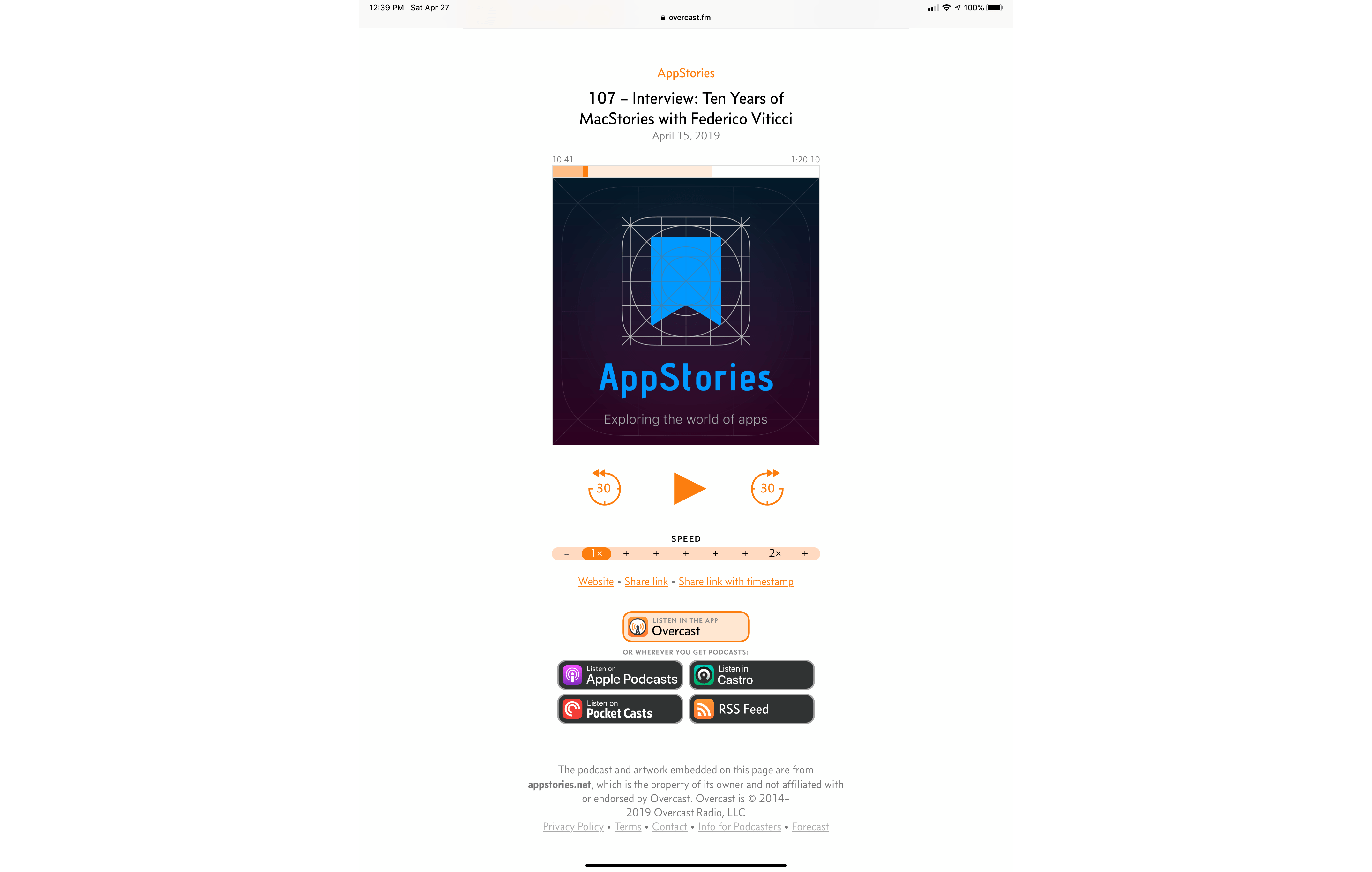
Overcast’s updated clip landing pages include links to Apple Podcasts, Castro, Pocket Casts, and the show’s RSS feed.
Although the link sharing feature of Overcast isn’t new, Arment has refreshed the landing pages for the links to include badges for Apple Podcasts, Castro, Pocket Casts, and the show’s RSS feed, so users can access the linked show from any of these other popular podcast players or the show’s RSS feed.
Expanding clip sharing to add video support is an excellent addition to Overcast. Whether you’re promoting your own show or want to share a snippet of your favorite show with friends, Overcast has made the process so simple that I expect we’ll begin seeing many more of these clips on Twitter, Instagram, and on other social networks very soon.
Castro Launches Top Picks Feature for Intelligent Episode Recommendations
In an update arriving today, Castro is introducing a new Top Picks feature designed to make managing a large number of podcast subscriptions easier than ever.
One of Castro’s most defining traits is its triage system: the app by default stores new episodes of shows you’re subscribed to in a New section, not in your playback queue, and inside New you can send the episodes you care about to your queue, while archiving anything that doesn’t interest you. If you subscribe to a wide array of shows, Castro’s New section is great; however, one drawback is that it previously lacked any sort of priority or hierarchy. Though Castro offers the option of having certain shows go straight to your queue, that requires manual configuration, and it’s really only ideal for shows that you want to listen to every single episode of. In most cases, the majority of shows will land in New, and Castro previously had no way of knowing which of those episodes you were more likely to care about. That’s why Top Picks was created.
Top Picks is an addition to the New tab which highlights episodes from your subscriptions that Castro thinks you’ll want to listen to. You can still access your full subscription roster at any time, but Top Picks will serve as a curated subset of episodes that’s easier to sort through.
Shows are surfaced in Top Picks based on your listening history, which the app analyzes on-device using only local data, so it remains private. If you’re new to Castro, this means it may take a little time to get the best Top Picks suggestions, but the good news is that training the system merely requires listening to the shows you care about. As you make decisions about what to listen to, Castro learns from those choices and uses that data to inform what does and doesn’t get sent to Top Picks.
If you only listen to a handful of podcasts, Top Picks likely isn’t for you because it addresses a problem you don’t have. But for users whose subscriptions can be a lot to keep up with, the feature simplifies the act of triage and, in the process, makes Castro an even better tool for enjoying the ever-growing world of podcasts.
Castro Launches Curated Podcast Collections and Instant Search to Improve Discovery
One of our favorite third-party podcast clients, Castro, was updated today with improvements aimed at offering a better discovery experience. Through curated podcast collections, new buttons to add podcasts to your library, and instant search, Castro’s development team has brought positive change in several connected areas.


